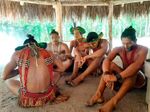
Pataxó Indigenous Community
"Nowadays, the Pataxó strive to revive their language — the Patxôha — being taught at many Pataxó Indigenous schools, but they all speak Portuguese.
"For centuries, the Pataxó have been struggling for the possession of their traditional lands. Even though it is established in Brazil's constitution, the claimed demarcation has been pending for decades and they are facing the invasion of ranchers and gunmen, resulting in murders of their leadership and other members of the community.
"In 1999, the Pataxó occupied the Monte Pascoal National Park, an important part of their traditional territory. At this moment in 2020, the situation is becoming harder as the current government is clearly against the Indigenous reserves.
"Pataxó handcrafts are an important source of the community's livelihood and they are usually sold to tourists visiting the area. With the pandemic, tourists are not coming and the opportunity to sell their work to you was of great help.
"Tigê, a Pataxó leader, is coordinating the communication with the indigenous artisans, collecting the items from the villages and shipping them to us."

Pataxó Indigenous Community Rio de Janeiro, Brazil
"The Pataxó Indigenous community lives in villages in the southern part of the Brazilian state of Bahia, some near to tourist areas. The mother village of Barra Velha has existed for nearly two and a half centuries. The contact with non-Indigenous people goes back to the sixteenth century, and often they were forced to hide their customs.
"Nowadays, the Pataxó strive to revive their language — the Patxôha — being taught at many Pataxó Indigenous schools, but they all speak Portuguese.
"For centuries, the Pataxó have been struggling for the possession of their traditional lands. Even though it is established in Brazil's constitution, the claimed demarcation has been pending for decades and they are facing the invasion of ranchers and gunmen, resulting in murders of their leadership and other members of the community.
"In 1999, the Pataxó occupied the Monte Pascoal National Park, an important part of their traditional territory. At this moment in 2020, the situation is becoming harder as the current government is clearly against the Indigenous reserves.
"Pataxó handcrafts are an important source of the community's livelihood and they are usually sold to tourists visiting the area. With the pandemic, tourists are not coming and the opportunity to sell their work to you was of great help.
"Tigê, a Pataxó leader, is coordinating the communication with the indigenous artisans, collecting the items from the villages and shipping them to us."

Brazil Fulfillment Hub
1 Review for








